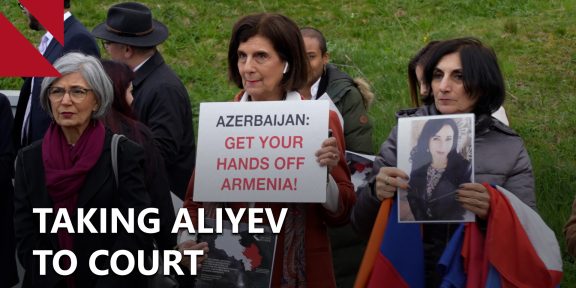By Mark Dovich
The Organization for Security and Co-operation in Europe announced Wednesday it would dispatch a “needs assessment team” to the Armenian side of the border with Azerbaijan, one day after Armenian Foreign Minister Ararat Mirzoyan said the idea of deploying an OSCE border mission to the region was “under discussion.”
“Following the invitation by the government of Armenia, the OSCE will send a needs assessment team to the country on 21-27 October,” the organization said in a statement. It said its experts “will visit areas along the Armenian-Azerbaijani border and hold consultations with the relevant national and local stakeholders as well as international partners on the ground.”
At a press conference the day before, Mirzoyan told reporters, “The issue of dispatching OSCE observers to the Armenian side of the Armenia-Azerbaijan border is also under discussion. We will have clarity on this issue very soon.”
In 1994, the OSCE formed the Minsk Group, a diplomatic body tasked with mediating a peaceful resolution to the Karabakh conflict. France, Russia, and the United States co-chair the group. Its work has been effectively frozen since Russia’s full-scale invasion of neighboring Ukraine in February.
The OSCE’s move to send a needs assessment team to Armenia comes two days after the European Union gave its final approval to an earlier decision to temporarily deploy a civilian monitoring mission to the region.
The EU is set to send up to 40 monitoring experts from its mission in neighboring Georgia to the Armenian side of the border with Azerbaijan for a maximum of two months.
The mission is “aimed at facilitating the restoration of peace and security in the area, the building of confidence and the delimitation of the international border,” the European Council said in a statement.
An advance team of EU monitors is already in Armenia to prepare for the mission.
On Tuesday, an EU technical team visited Armenia’s eastern Gegharkunik region, which suffered heavily last month in Azerbaijan’s unprecedented assault on Armenia, to get familiar with the situation on the ground.
“The delegation from the EU technical assessment mission assured me that they will carry out in-depth studies and submit regular reports,” Gegharkunik governor Karen Sargsyan wrote on Facebook. “I will ensure that the EU mission’s monitoring work will be provided constant support, and we will actively cooperate with them.”
The EU mission was first agreed at talks earlier this month in Prague between Armenian Prime Minister Nikol Pashinyan and Azerbaijani President Ilham Aliyev, brokered by French President Emmanuel Macron and European Council President Charles Michel.
Aliyev, however, dismissed proposals for the mission to deploy to the Azerbaijani side of the border, forcing the observers to work only from the Armenian side.
“There was an attempt to send this mission also to the Azerbaijani side, which we firmly rejected,” Aliyev was quoted as saying last week by the Interfax Azerbaijan news agency.
Brussels’ decision to deploy a border mission to the region has provoked combative reactions in both Tehran and Moscow.
“Any European military presence under any guise is rejected,” a senior aide to Iranian President Ebrahim Raisi wrote on Twitter last week.
At a press conference a few days earlier, a spokesperson for Russia’s Foreign Ministry said, “We see this as yet another attempt by the EU to interfere by any means in the normalization of relations between Armenia and Azerbaijan, to oust our country’s mediation efforts.”
Meanwhile, the Kremlin has proposed a mission of its own, with Russian Foreign Minister Sergey Lavrov telling Mirzoyan last week that the Collective Security Treaty Organization, a Russian-led military alliance, stands “ready” to dispatch border observers.
“The idea is to send a monitoring mission of CSTO observers to the territory of Armenia on the border with Azerbaijan,” Lavrov said. “As soon as you have free time, we will be ready to formally approve this mission, and it can get to work.”
Asked by reporters earlier this week about the prospect of a Russian-led border mission, Mirzoyan said, “We are at the stage where there is no decision, but there are discussions.”
The flurry of diplomacy around competing observer missions comes as tensions remain high along the border between Armenia and Azerbaijan, with each country’s defense ministry continuing to accuse the other of ceasefire violations on a near daily basis.
Azerbaijan’s major attack last month on three dozen municipalities in Armenia marked the bloodiest outbreak of hostilities since the Karabakh war two years ago, leaving nearly 300 soldiers dead and another 600 or so injured, according to official figures from both sides.
















